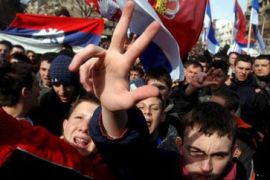David Miliband, the UK’s foreign minister, and Frank-Walter Steinmeier, his German counterpart, made similar announcements.
“A majority of the EU states will recognise Kosovo,” Steinmeier predicted.
Diplomatic reactions
The first country officially to recognise Kosovo was Afghanistan. A foreign ministry statement spoke of the need to respect the “will of the people”.
But many countries, including China, Romania and Russia, have opposed Kosovo’s independence.
Slovakia and Spain made it clear that Kosovo’s independence bid, and efforts to recognise it, were illegal under international law.
“Slovakia does not see a way to recognise Kosovo,” Jan Kubis, the country’s foreign minister, said.
Slovakia, with its sizable Hungarian minority, fears Kosovo’s move will feed its own ethnic tensions.
Spain, which struggles with its own separatist movements, also refused recognition.
“The Spanish government is not going to recognise the unilateral act proclaimed yesterday by the Kosovar assembly,” Miguel Angel Moratinos, Spain’s foreign minister, said earlier.
“We’re not going to recognise it because we don’t consider that it respects international law.”
Serbia and Russia, neither members of the EU, have also objected to Kosovo’s independence, with Russia warning that the secession would have repercussions in breakaway regions across the world.
Criminal charges
Serbia vowed to block the territory, which it still claims as its own, from joining any world body and launched criminal action against Kosovo’s leaders for making Sunday’s declaration of independence.
Serbian police on Monday filed criminal charges against the three most senior Kosovan figures – Fatmir Sejdiu, the president, Hashim Thaci, the prime minister, and Jakup Krasniqi, the parliamentary speaker – with “organising the proclamation of a phony state on Serbian territory”.
 |
Kouchner and his UK and German counterparts
said they are going to recognise Kosovo [AFP] |
In a statement the Serbian interior ministry accused the three of committing a “a serious criminal act against the constitutional order and security of Serbia”.
Protests were held in Belgrade, the Serb capital, and in Kosovo, where Serb groups rejected Kosovo’s secession.
“The protests we’ve seen [today] have been relatively peaceful … but there is a huge amount of anger here,” Nazanine Moshiri, Al Jazeera’s correspondent in Belgrade, reported.
“Kosovo is of huge importance to Serbia both historically and religiously.”
Tensions also increased in Serb-controlled areas on Monday as thousands of Kosovo Serbs attended a protest in one of the northern towns, demonstrating against the independence declaration.
UN targeted
A UN car was torched overnight in the northern Serb town of Zubin Potok, witnesses said.
And on Monday, an explosion went off in Mitrovica, another Serb stronghold, near the building where UN police and OSCE offices are located. Police at the scene said no one was injured.
They took control of the area and launched an investigation into the incident.
The explosion was the second of its kind since Hashim Thaci, the breakaway province’s ethnic Albanian prime minister, formally announced on Sunday that “Kosovo is proud, independent and free”.
He made the statement after all 109 deputies present a special session of parliament voted to declare independence from Serbia.
Thousands of ethnic Albanians took to the streets of Pristina to celebrate, but at the same time demonstrators in Belgrade stoned the US embassy in protest against US support for Pristina.



